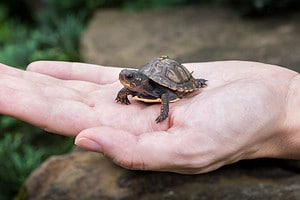Tortoises make great long-lived pets for those who can care for them properly. Caring for a tortoise is a huge responsibility, and you will need to ensure that you have the necessary finances to care for them throughout their lives. Since the average tortoise lives for around 50 years, you will need to have the money to care for them during this time.
When you first get a tortoise, the initial costs will be much higher than the ongoing costs. The initial costs for a pet tortoise include its habitat, heating, and lighting. Whereas the ongoing costs include their food and supplements.
This article will discuss the costs associated with purchasing and caring for a pet tortoise, and what you can expect.
How Much Does a Tortoise Cost?
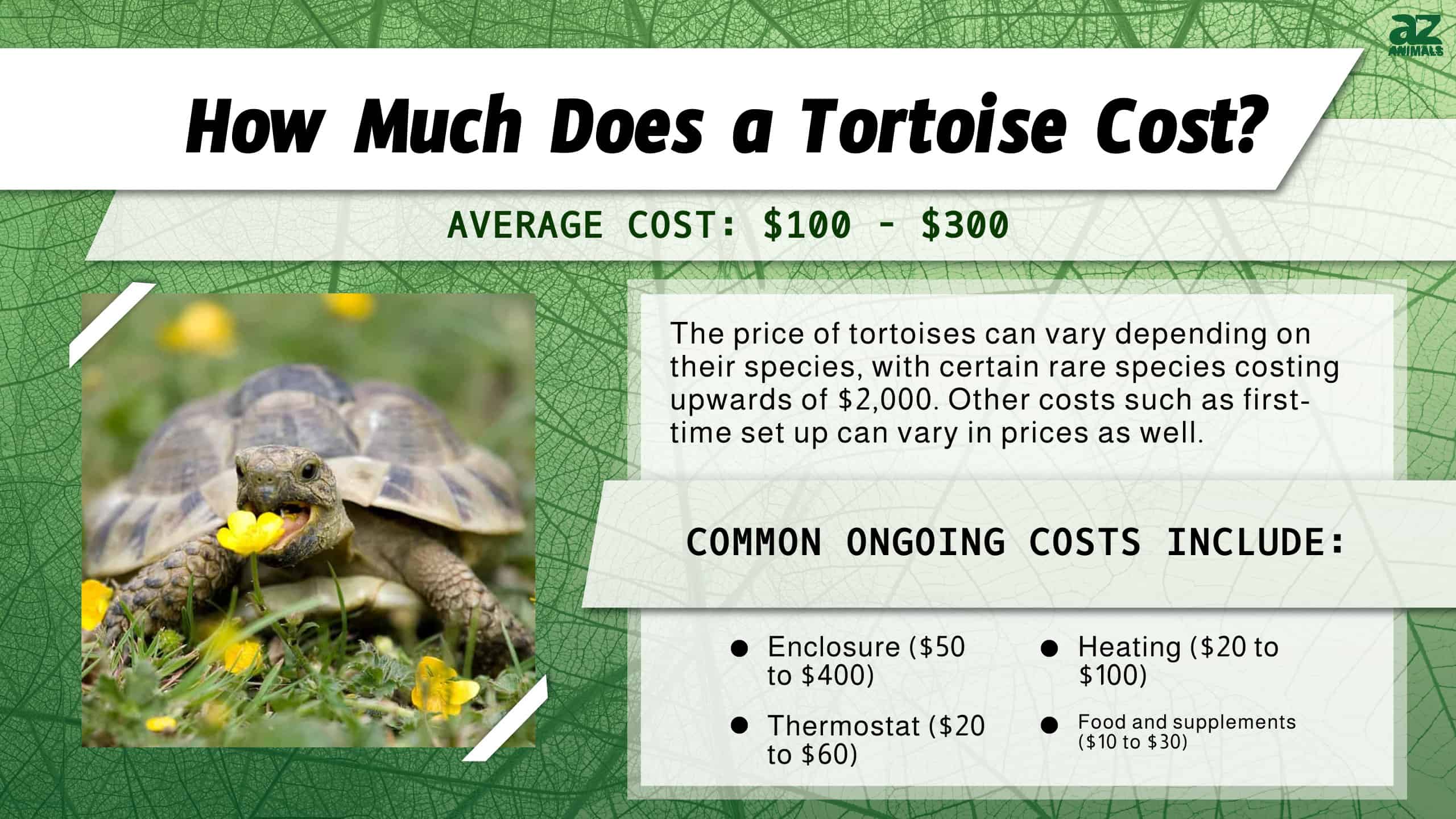
The average cost of a pet tortoise varies from $100 to $300. This price is typical for the common species of tortoises, like the Sulcata or the Russian tortoise. The rarer species of tortoises can cost way more, sometimes a few thousand dollars.
The below table will give you a breakdown of the average cost of certain pet tortoises.0
| Type of Tortoise | Cost |
|---|---|
| Sulcata tortoise: | $100 to $1,200 |
| Hermann’s tortoise: | $150 to $600 |
| Russian tortoise: | $50 to $500 |
| Greek tortoise: | $150 to $800 |
| Pancake tortoise: | $500 to $3,500 |
| Leopard tortoise: | $500 to $5,000 |
| Marginated tortoise: | $300 to $600 |
| Red-footed tortoise: | $150 to $1,500 |
| Indian Star tortoise: | $350 to $5,000 |
| Yellow-footed tortoise: | $300 to $600 |
| Egyptian tortoise: | $800 to $5,000 |
What Is The Most Expensive Pet Tortoise?
The pancake, Egyptian, and leopard tortoises are among the most expensive pet tortoises you can purchase. Some of these tortoises can be priced up to $5,000 for an adult. This is because they are considered rarer and more unique than other species of tortoise. They are also unlikely to be found in pet stores, so your best chance at finding these tortoises is from a breeder. Most reputable tortoise breeders will price their tortoises according to their quality and age.
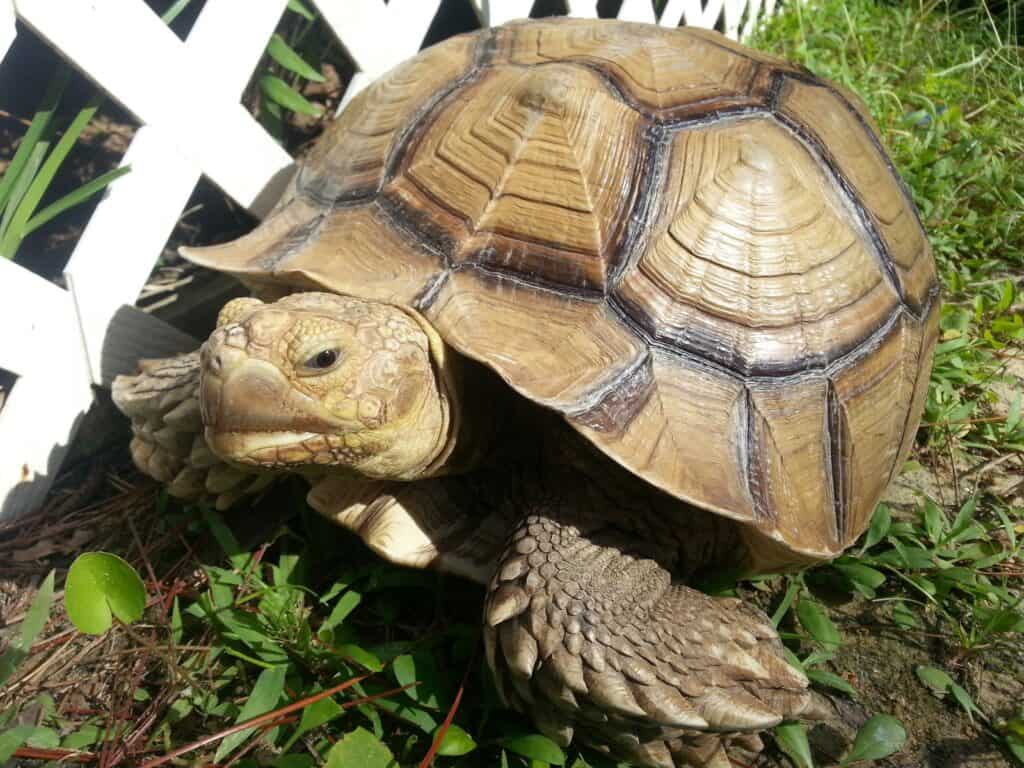
A pet tortoise’s price is contingent on its age, health, size, species, and where you buy it.
©TinaO/Shutterstock.com
Cost Factors
Certain factors can influence the price of a tortoise. This includes factors like their age, health, size, species, and where you purchase them from.
Age and Size
Hatchling or juvenile tortoises are usually priced lower than adults. This is because it is it trickier for the owner to raise and care for a young tortoise, and there is no guarantee that the tortoise will make it to adulthood. Whereas adult tortoises are already their full size and have made it past their vulnerable life stages. Also, adult tortoises are usually ready to breed and cost more for potential tortoise breeders to purchase.
Health
A healthy tortoise is going to cost more than an unhealthy tortoise. This is simply because the tortoise may or not recover from their illness, or perhaps their lifespan will be shortened. An unhealthy tortoise will also require expensive vet visits, which not many tortoise owners may have the money for.
Species
As we discussed above, certain species of tortoises cost more than others because of their rarity. The common species of tortoises are always priced lower in comparison to endangered and unique species, mainly because they are difficult to come by.
Place of Purchase
When it comes to purchasing pet tortoises, you generally have a few options. You can either buy them from a pet store, breeder, or online sites. Tortoises from a pet store are usually lower in price than ones from a breeder or online website. It may also be possible to acquire a tortoise from an adoption or rescue center at the appropriate adoption fee.
Cost of Tortoise Supplies
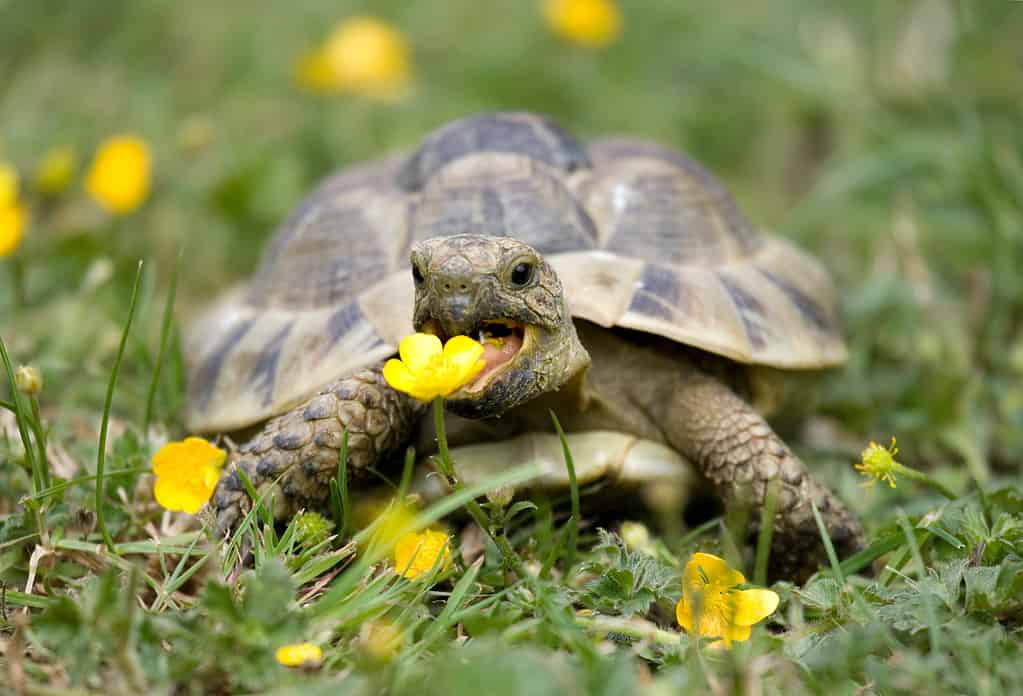
Tortoises can range in price depending on their species. Some rare tortoise species can cost over $2,000.
©chrisbrignell/Shutterstock.com
Before purchasing a pet tortoise, you need to ensure that you have the correct housing and supplies for the species. It is crucial to do in-depth research on the type of tortoise you are keeping since the supplies and care requirements can vary. At first, you can expect to pay between $150 to $750 for your pet tortoise’s supplies.
| Supplies | Cost |
|---|---|
| Enclosure: | $50 to $400 |
| Heating: | $20 to $100 |
| Thermostat: | $20 to $60 |
| Lighting: | $25 to $50 |
| Thermometer and hydrometer: | $5 to $15 |
| Hideout: | $3 to $12 |
| Plants and enrichment: | $5 to $30 |
| Substrate: | $8 to $20 |
| Food and water bowls: | $5 to $28 |
| Food and supplements: | $10 to $30 |
| Spray bottle/misting device: | $2 to $5 |
Enclosure
All tortoises require an appropriately sized enclosure according to their species. This enclosure can either be set up indoors or outdoors and be as simple or lavish as you like. Depending on the type and quality of the enclosure, you can expect to pay between $50 to $400 for it. You have the option of purchasing a pre-made enclosure for your tortoise or spending money on materials to construct it yourself. Keep in mind that most tortoise enclosures need to be upgraded as your tortoise grows, which can cost you more money.
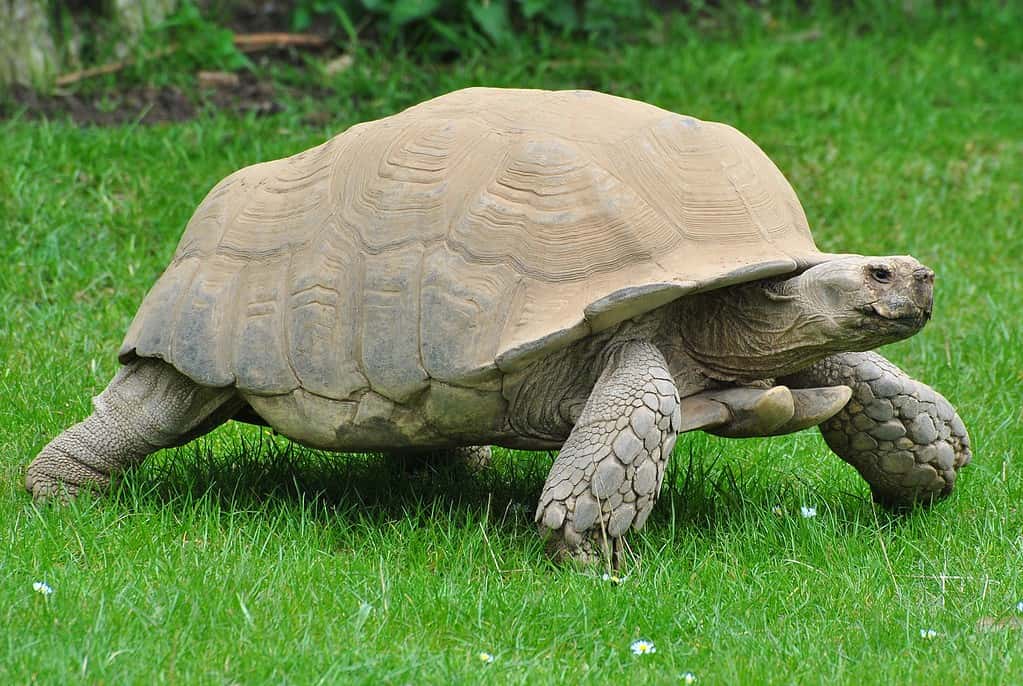
Certain species of tortoises can grow really large. This means that they require a much larger habitat than the smaller species.
©John5199, CC BY 2.0, via Wikimedia Commons – License
Heating and Lighting
All indoor pet tortoises need artificial lighting and heating. In some cases, outdoor tortoises may also need this.
As cold-blooded reptiles, tortoises need an external heating source to control their body temperature. They benefit from having a basking spot with essential UVA and UVB lighting, along with a heating lamp. The rest of their enclosure should have a warm ambient temperature with a colder spot to cool down. When running any heating equipment in your tortoise’s enclosure, be sure to connect it to a thermostat for safety purposes. Certain species of tortoises also need their enclosure regularly misted to maintain a comfortable humidity level. Window lighting is not going to provide your tortoise with the right heating and lighting they require.
Since your tortoise’s heating and lighting will need to be plugged into an electrical outlet, it will cost money to run as well. You will need to use a thermometer to monitor the temperature in your tortoise’s enclosure, along with a hydrometer for the humidity levels.
Hideout, Substrate, and Enrichment
Tortoises can easily become bored in a plain enclosure without substrate, plants, and other enriching items. You don’t have to spend too much on improving the look of the enclosure if it has everything your tortoise needs already. Most tortoises will benefit from a hideout, a safe substrate, and non-toxic live or fake plants. These items can vary in price, but most are relatively inexpensive and can be a once-off cost. However, the substrate is likely going to be an ongoing cost since it should be cleaned out and replaced regularly.
Food and Supplements
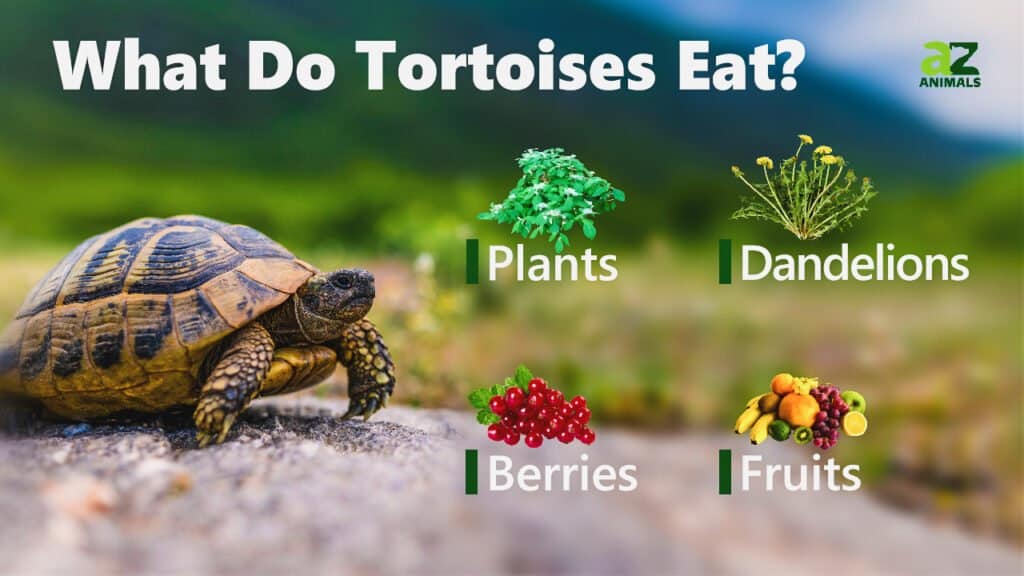
Tortoises require fresh food and water daily. Your tortoise’s water dish should be refilled daily and topped up when it is running low. Some tortoises like to soak in their water dish, so providing a shallow yet sizeable dish that allows for this is recommended.
In terms of food, you can expect to pay between $10 to $20 for a commercial tortoise pellet. This type of food can be soaked and fed to your tortoise daily. However, the tortoise pellets that you choose should be formulated for the species of tortoise you keep. You will also need to spend around $10 on a dietary supplement for your tortoises, like reptile calcium and vitamin D3 powders. This is especially important if your tortoise is still developing or doesn’t receive adequate sunlight or UV exposure.
Many tortoises also require daily fresh foods and leafy greens in their diet. You can find tortoise-friendly salads at many grocery stores but be sure they are free of any harmful chemicals.
Tortoise Veterinary Costs
Like with most pets, tortoises need to be taken to a veterinarian when they are ill. Since they are reptiles, tortoises need an exotic veterinarian specializing in reptiles to diagnose and treat them. You also have the option of taking your tortoise for vet checkups every couple of months to ensure they are healthy. This would be beneficial for young or senior tortoises, who may need more health monitoring than a healthy adult tortoise.
A regular vet checkup may cost you between $50 to $120 for your tortoises. However, certain treatments, lab work, imaging, and surgery can cost up to $2,000 for a tortoise. It’s important to determine whether you have the financial ability to take your tortoise to a veterinarian when necessary before you get one. Even the healthiest tortoises can fall sick or get injured. Young and developing tortoises are also at risk of certain growth-related problems that require medical treatment.
In Summary – Annual Cost of Owning a Tortoise
Once you have purchased the main initial supplies for your tortoise, you mainly need to spend money on any ongoing costs like food, supplements, substrate, and salads. These ongoing costs range from $100 to $380 per year for your tortoise. This cost will be much higher if you need to take your tortoise to a veterinarian. Any UV lighting bulbs should be replaced after 2 to 3 years, or as advised by the manufacturer.
The photo featured at the top of this post is © Elena M. Tarasova/Shutterstock.com
Thank you for reading! Have some feedback for us? Contact the AZ Animals editorial team.






